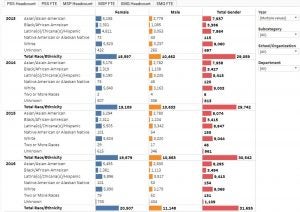Fellow Bruins,
Extraordinary times
This has been a breathless quarter for higher education. Just on our campus, consider: “Kanye Western”; #BlackBruinsMatter (which triggered the launch of this CrossCheck platform); the Regents’ Working Group on Principles Against Intolerance (with anti-Semitism taking the limelight); hateful posters targeting student organizations. And of course, all of this is happening in the national context of Mizzou, Yale, CMC, Occidental, Princeton, and horrifically and saliently, Paris, Beirut, and Mali. When I took this position as Vice Chancellor of Equity, Diversity and Inclusion, I knew that it would be a hard job. But I had no real idea. As a stranger recently tweeted to me, “You should’ve said no [to the job], bruh.”
Hate Posters by Outside Provocateurs
In this CrossCheck, let me specifically address the hateful posters that appeared in Westwood on November 12, 2015. These posters anonymously attacked two separate student organizations: Students for Justice in Palestine (SJP) and the Muslim Student Association (MSA). (We must remember not to conflate politics with religion: SJP is a secular political organization whereas MSA is a religious affinity organization). The posters featured visceral juxtapositions of text and images that created powerful, emotional, and inflammatory associations between SJP and MSA with terrorism, murder, and hatred of Jews. These were not nuanced arguments on the merits; they were designed to shock and terrify.
Eventually, David Horowitz took credit. This man has no direct connection to UCLA. But as he has done before, here and elsewhere (similar posters appeared on college campuses in southern California and the D.C. area), David Horowitz posted vitriolic images that sent hostile political messages targeting members of our community. And his desire to gain publicity and notoriety worked according to plan, including a “Letter to the Editor” in the Daily Bruin.
Harm + Response
What harm did these posters cause? From personal conversations, I know that members of our Bruin family felt threatened, politically chilled, disrupted from their daily practices. They felt caricatured, demonized, isolated, targeted. And after Paris, some of our fellow Bruins feel even more anxious that they will be judged not on the content of their character but on stereotypes and prejudices. It can’t be easy studying for final exams in this climate.
UCLA responded by taking down the posters immediately because they vandalized property, like graffiti. (The last time similar posters appeared, Bruins for Israel and other student organizations volunteered to do just the same.) The Chancellor clearly expressed disapproval of the posters. I and other administrators met with all relevant student organizations. And the Dean of Students wrote a “Letter to the Editor” urging students to “engage in compassionate debate” and “elevate” the political discourse instead of allowing outsiders to coarsen it.
The Internet has taught us to stop “feeding the trolls.” But, still more is warranted, which is why I’m writing here and now.
It’s personal
Back in 2006, some organization calling itself the “Bruin Alumni Association” (BAA)—with no official connection to UCLA—blacklisted 31 faculty members as radicals. Frankly, I was puzzled to find myself listed as one of the “dirty thirty” because historically I’ve been viewed as too moderate. The BAA even offered students $100 to secretly tape lectures to get embarrassing “dirt.” Why was I marked? According to BAA’s explanation, it was because I was a “model minority” who should not have been defending race-based affirmative action in higher education. As an aside, they also found puzzling that I would write about the JapaneseAmerican internment, when I’m ethnically Korean.
As it turned out, the BAA was essentially a one-man organization run by Andrew Jones, a UCLA grad, who had worked for David Horowitz. I don’t want to taint by association, and as I recall, David Horowitz denied specific involvement in that gambit and indeed said he fired Jones. Regardless, that was my first taste of bullying tactics. Even my own brother, who’s completely apolitical, asked me suspiciously what all this stuff was about. That’s why it’s personal. It’s also why I “get it” about the importance of academic freedom.
It’s also academic, or as Sam Cooke sings, “Don’t know much about history….”
Besides being personal, it’s also academic. As a scholar of the Japanese American internment, I am particularly sensitive to political opportunists scapegoating an unpopular outgroup under the cloak of national security. After the bombing of Pearl Harbor, we locked up almost 120,000 persons of Japanese ancestry in camps, without individual determinations of guilt. Two thirds of them were United States citizens because they were born on American soil. (The other third—even if they wanted to become citizens—were racially barred from naturalization.) Every branch of government—the liberal icon Franklin Delano Roosevelt, Congress, and the Supreme Court— failed that civil rights moment miserably.
After 9/11, some politicians invoked Japanese American internment favorably. After Paris, politicians have already started to invoke internment as justification for mistreating Syrian refugees, in historically clueless ways. This falls into a long history of ethnic hostility to refugees, ranging from Catholics to Jews to Asians. While I recognize that national security in the face of modern terrorist tactics presents extraordinary challenges, I also understand the real harms caused by terrorists attacking people publicly and anonymously, creating anxiety and fear, then taking responsibility in order to broadcast some political message across social media. But we also have obligations to learn from the past—or at least to remember and consider it. As George Santayana cautioned: “Those who cannot remember the past are condemned to repeat it.”
“Don’t know much about psychology….”
In reaction to increased campus activism across the nation, a growing backlash has emerged. It characterizes students as wimps, overly sensitive, fragile, and worse, humorless and clueless about the First Amendment. University administrators are criticized for coddling and capitulating.
I reject the thrust of this characterization. Most underrepresented groups on campus are anything but weak. Their stories of resilience, in the face of adversity and isolation, are remarkable. They have thicker skins than you can imagine. But what’s being characterized as conclusion is in fact an empirical question. Do certain events—whether they be posters, costumes, or words—have a measurable impact on student welfare? Or are students making a mountain out of a molehill (or as one professor privately assured me, a “tempest in a teapot”)?
Did you know there’s a phenomenon called “stereotype threat” that can actually inhibit students’ performance when negative stereotypes about them are in the air? (For details, check out the amicus brief I helped write for the Supreme Court Fischer II affirmative action case on behalf of the nation’s leading stereotype threat scholars.) Did you know that when Native American students are exposed to Indian “mascots” such as Chief Wahoo or Pocahantas, they report less self-esteem and “fewer achievement-related possible selves”? Did you know that most Americans implicitly associate Asians with “foreign,” and that such associations predict the likelihood of giving national security jobs to Asians? (Remember Wen Ho Lee? Have you heard that Rep. Ted Lieu, who represents UCLA’s district, has asked for an investigation to see why there’s been a spate of espionage arrests of Asian American scientists, only to have charges summarily dropped?)
And where do you think all these negative stereotypes come from? Do you think hateful posters might fuel the flames? Do you think that the propaganda of dehumanization, on allsides of contentious issue, is harmless?
Final confessions
I expect this essay to draw fierce criticism by those who believe that David Horowitz got things just right, even if he exaggerated a bit. Immediately, critics will pull me into substantive policy debates concerning a set of international politics about which I am far from expert. The punchline will be: “How dare you defend those people?”
Here’s the answer: That’s my job. I am not taking a stance on international politics. I am, however, questioning the tactic of guilt by association, of using blacklists, of ethnic slander, and sensationalized images engineered to trigger racially-tinged fear.
I am an immigrant, but I grew up mostly in Skokie, Illinois. I remember the neo-Nazi march. Most of my friends were Jewish. I attended more Bar and Bat Mitzvahs than I can recount. I also recognize the strong affinity I have with Jewish culture and people because of that familiarity. But I also know that I must check myself against motivated reasoning, which invites breaking in favor of friends and ingroups. My job is to build equity for all, which means that I can’t let personal preferences or politics get in the way of building an equal learning environment for everyone. This is what I’m trying to do every day, with uncertain success.
I’m haunted by that joking tweet: “You should’ve said no, bruh.” But at bottom, I believe in the possibility of deliberative discourse, about intellectual honesty, about engagement on the merits. I believe in rejecting caricature, simplification, threats. I believe that we can actually change our minds through persuasion, not coercion.
Bruh, that’s why I took this job.
References
Fryberg et al. 2008 (indian mascots)
Yogeeswaran & Dasgupta 2010 (Asians and national security jobs)






